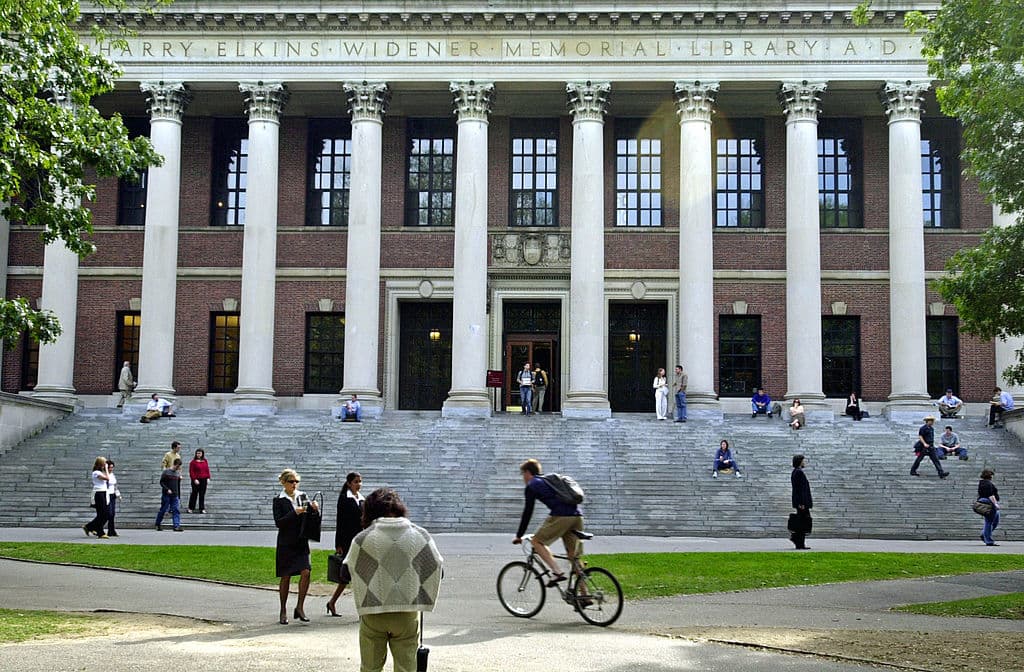The Deep Roots of Harvard’s ‘Moral Crisis’ Over Israel
The university’s leaders, its central governance, and decades of anti-Israel sentiment in the classroom might all be to blame.

Harvard’s business and medical schools are emerging as beacons of moral leadership — in a relative sense — at a campus where other celebrated schools are falling short.
That is the opinion of the school’s former president, Larry Summers, a former secretary of the Treasury and a veteran of campus culture wars. His comments come as the school’s current president, Claudine Gay, appears to be failing to mount a robust response to surging antisemitism on campus.
“I am very encouraged by the Business School and Medical School’s response, which were both belated but appropriate,” Mr. Summers tells the Sun. “I don’t know whether the delay reflected its taking alumni pressure for them to act, or the university’s central administration slowed them down.”
On X, Mr. Summers praised the professional schools for having “aggressively and effectively addressed issues raised by Hamas terror and subsequent anti-Semitic speech.” He noted, though, that “the Harvard University response is not nearly as strong. This is very unfortunate at a time of moral crisis.”
Users cheered his remarks with comments like “#FireClaudine.” An alumnus of Harvard College and Business School, James Higgins, who runs a center-right coalition of influential conservatives at New York City, the Monday Meeting, wrote: “Time for new leadership at Harvard? Or perhaps time for the return of earlier leadership?” He tagged Mr. Summers.
Mr. Summers references a statement issued last week by the business school dean, Srikant Datar, which reaffirmed his commitment to condemning terrorism and any support for it on campus. Mr. Datar outlined robust plans to combat the antisemitism that business school students are facing, including the launch of community spaces to foster dialogue and a group to investigate the roots of the pernicious ideology in the classroom.
The latest letter was more substantial than the remarks issued by Ms. Gay on Friday, which also discussed the safety threats to Jewish students on campus. “We must find a way forward,” Mr. Datar asserted. “Because if we can’t do it here — drawing on the strength of our community, the knowledge and experience among us, and the resources of Harvard University — then where else can this work be done?”
The university’s administrative bodies, Mr. Summers suggests, might be responsible for the delayed responses from deans of its various schools. Harvard is partially governed by the Board of Overseers, composed of alumni who meet five times a year and elect new members each spring.
Harvard’s smaller, yet more powerful, governing body is the oldest corporation in the Western Hemisphere, the Harvard Corporation. It consists of Ms. Gay and a handful of fellows of the college, who vote on pressing issues including setting the university’s budgets and selecting the deans of various schools.
Mr. Higgins points the blame not toward Ms. Gay, who was only inaugurated in September, but toward the school’s “self-perpetuating board,” which creates a “downward spiral” in campus ideology by bringing to the school’s helm those with like-minded, “woke” views.
The Harvard Corporation, Mr. Higgins says, “is enormously powerful, enormously wealthy, heavily-tax favored institution, and it is effectively accountable to almost no one.” He claims that “it’s very difficult to change the direction of a ship that big” — even as prominent donors have threatened to sever their ties to the school.
Alumni, meanwhile, are directing their ire toward Ms. Gay and the college’s dean, Rakesh Khurana. The latest show of defiance against the school was a letter signed last week by more than a thousand alumni, including Senator Cruz, demanding that the two leaders develop concrete plans to combat growing harassment of Jewish students and commit to “protecting all its students, not just those that shout the loudest or blare the most polarizing rhetoric.”
The blame for anti-Israel sentiment at Harvard could have a longer history. “This has been building at universities for decades and cannot be addressed simply by strong statements,” a professor emerita at Harvard, Ruth Wisse, tells the Sun. She says that classes on the Middle East have pushed anti-Israel “propaganda,” and professors have “freely taught anti-Zionism as part of their anti-American, ‘anti-colonialist’ agenda.”
The numbers don’t lie: 48 percent of 18- to 24-year-olds across the country, asked if they side more with Israel or Hamas following the October 7 attacks, took the side of the terrorists.
Broader forces in American culture might also be at fault. “Students raised on anti-Jewish beliefs have been admitted without the kind of orientation that warns them against their other inherited prejudices,” Ms. Wisse says. Antisemitism seems to have grown worse alongside the “woke” movement: Schools that became the subject of 1960s riots, she says, “may sadly have encouraged the intersectional alliances against Zionism as a means of deflecting violence against themselves.”
“And that,” Ms. Wisse says, “is still only part of the story.”
_______
This edition has been corrected from the bulldog to reflect that the body to which Mr. Higgins refers is the Board of Overseers.

